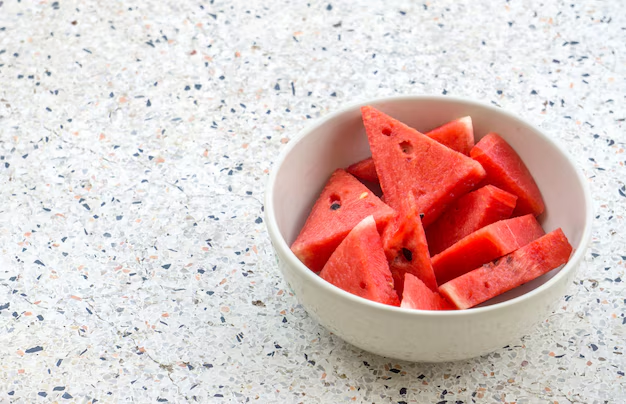Your Guide to Can a Diabetic Eat Watermelon
What You Get:
Free Guide
Free, helpful information about Diabetes FAQ and related Can a Diabetic Eat Watermelon topics.
Helpful Information
Get clear and easy-to-understand details about Can a Diabetic Eat Watermelon topics and resources.
Personalized Offers
Answer a few optional questions to receive offers or information related to Diabetes FAQ. The survey is optional and not required to access your free guide.
Is It Safe for Diabetics to Enjoy Watermelon?
For individuals living with diabetes, choosing the right foods is essential to managing their blood sugar levels effectively. But when it comes to sweet and juicy fruits like watermelon, questions often arise: Can a diabetic eat watermelon? Let's delve into what makes this summer delight special and whether it can fit into a diabetes-friendly diet.
Understanding Watermelon and its Nutritional Profile
Watermelon boasts a reputation for being a refreshing, hydrating treat. Its high water content—about 92%—makes it a favorite for beating the heat. But what about its impact on blood sugar? Watermelon contains natural sugars, and its glycemic index (GI) is approximately 76, categorizing it as a high-GI food. Foods with a high GI can cause rapid spikes in blood sugar levels.
Yet, the glycemic load (GL) of watermelon is relatively low because of its high water content and fiber. Glycemic load considers both the quality and quantity of carbohydrates, and watermelon’s GL is just 4 per serving, which means it may not impact blood sugar as drastically as its GI suggests.
Moderation is Key
Moderation is crucial for diabetics when incorporating any high-GI food. Small servings of watermelon can be part of a balanced diet. A typical serving size of watermelon is about one cup (150-200 grams). This portion contains approximately 11 grams of carbohydrates, making it a manageable choice for those who count carbs as part of their diabetic management plan.
Here’s how diabetics can enjoy watermelon without derailing their blood sugar levels:
- Pair it with Protein or Healthy Fats: Mixing watermelon with a source of protein or fats, like nuts or yogurt, can help slow sugar absorption.
- Monitor Blood Sugar Levels: Keep track of how your body responds after eating watermelon to tailor your diet appropriately.
- Stay Within Your Carb Budget: Factor in the carbs from watermelon as part of your total daily carbohydrate intake.
Exploring Broader Support
Managing diabetes involves multiple facets, from diet to medical care, which can be financially demanding. Navigating expenses while keeping up with dietary requirements requires savvy financial management. Fortunately, many programs and services can offer relief and support:
- Government Aid Programs: Programs like Medicaid and Medicare can help cover medical expenses.
- Nutritional Assistance: SNAP (Supplemental Nutrition Assistance Program) offers food-related support.
- Financial Aid for Healthcare: Look for diabetes-specific grants and programs through nonprofits or government agencies.
- Credit Solutions: Low-interest health care loans or credit options can help manage any outstanding medical debt.
- Educational Grants: For those seeking to deepen their knowledge on diabetes management, scholarships or grants for health-related studies may be available.
Unlocking Resources for Better Health Management
Taking control of diabetes includes utilizing available resources effectively. Here’s a quick guide to some options that could provide vital support and aid in better diabetes management:
- 🏥 Medicaid/Medicare: Covers essential healthcare services.
- 🥦 SNAP Benefits: Helps with buying healthy food options.
- 💳 Low-Interest Health Care Credit: Assists in managing medical costs.
- 🎓 Educational Scholarships: Funds educational pursuits in health and nutrition sectors.
- 💰 Diabetic Grants: Special financial aid for diabetes care and management.
In conclusion, enjoying watermelon is indeed possible for those with diabetes, as long as moderation is maintained and it is part of a balanced diet. By keeping abreast of dietary needs and exploring supportive financial resources, diabetics can ensure a healthy and sustainable lifestyle.
What You Get:
Free Diabetes FAQ Guide
Free, helpful information about Can a Diabetic Eat Watermelon and related resources.

Helpful Information
Get clear, easy-to-understand details about Can a Diabetic Eat Watermelon topics.

Optional Personalized Offers
Answer a few optional questions to see offers or information related to Diabetes FAQ. Participation is not required to get your free guide.


